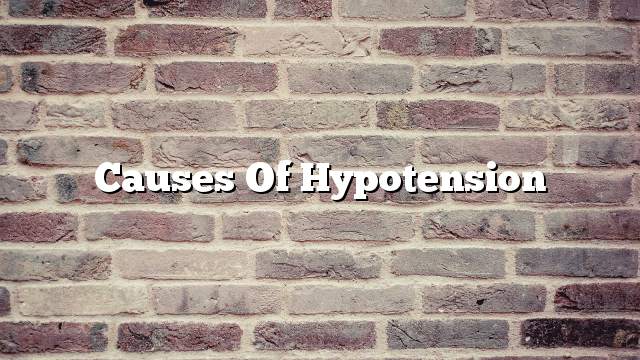Low blood pressure means that your blood pressure is less than normal. Another name for low blood pressure is hypotension. In healthy adults, blood pressure does not cause problems or symptoms. In fact, it may be normal for some people to have pressure Blood is low. For example, people who exercise regularly often have lower blood pressure than people who do not exercise.
However, if blood pressure suddenly drops, it may cause symptoms such as dizziness or fainting, especially when the pressure is too low. This can cause shock or injury due to loss of concentration and sudden dizziness. Injuries can be serious if not treated With her immediately.
Blood pressure is a measure of how much blood is pushed against the walls of the arteries as it moves through your body. When you measure blood pressure, you notice two numbers: systolic and diastolic blood pressure. Systolic blood pressure appears in the upper cell and shows how strong blood flow is when the heart pumps, Blood pressure between the heartbeat; ie, when the heart is in a state of relaxation and full of blood. For example, if the blood pressure of a person is 120 for systolic blood pressure and 80 for diastolic blood pressure and is written in the following image 120/80, 120 over 80. “This represents normal blood pressure, but less is pressure Low Blood 120/80.
There is no specific number to say that the pressure is very low. Most doctors look at blood pressure to be very low when it causes symptoms or causes sudden falls. In general, symptoms of hypotension occur when blood pressure is less than 90/60.
What are the causes of low blood pressure?
Some causes of low blood pressure are due to:
- Standing after sitting or lying down, as this can cause a rapid drop in blood pressure and is known as this condition known as hypotension.
- Stay in the standing position for a long time.
- Do not drink enough fluids (dehydration).
- Take some medications, such as high blood pressure medicines or other heart medications.
- Health problems such as thyroid diseases, severe infections, intestinal bleeding, or heart problems.
- Trauma, such as severe bleeding or severe burns.
What are the symptoms?
Many people suffer from low blood pressure without having any symptoms, and the symptoms that occur include:
- Feeling dizzy, or faint.
- Feeling upset in the stomach or wanting to vomit.
- Feeling thirstier than usual.
- A blurry vision.
- feel helpless.
- Breathing very fast.
If you have symptoms of low blood pressure, especially dizziness or fainting, consult your doctor.
